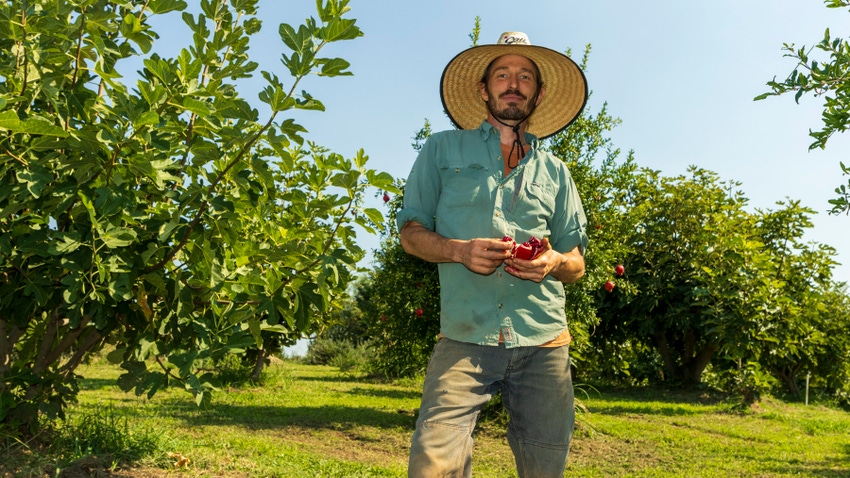
A vision to inspire, educate, and cultivate future generations of farmers continues to be nurtured across California by a nonprofit seeking to connect people with opportunities in agriculture.
An idea sown more than 30 years ago by northern California farmer Craig McNamara blossomed into a host of programs.
“I think at the time he saw the disconnect between youth and agriculture,” said Sri Sethuratnam, California Farm Academy Director of McNamara’s idea. The farm academy is part of the Center for Land-Based Learning (CLBL), a non-profit organization based in Woodland, California.
“That program still exists today,” he said. “It’s called the Farm Leadership Academy.”
Under the flagship program, “we tried to introduce all types of careers in agriculture to high school students,” said Marisa Alcorta, apprenticeship director for the center.
Through the various programs at the center, aspiring farmers and students can get hands-on training and curriculum designed to build a profitable farming business. Other programs aid employers in upskilling their employees. This can include helping employees build skill sets in specific job tasks, or simply help others with language skills. In some cases, employers have used the opportunities to help longtime employees with little-to-no English skills learn English as a second language and later become promotable to management positions, said Mary Kimball, CEO of the Center for Land-Based Learning.
Such was the case with one of Kimball’s board members, who had a 20-year employee he wanted to train for a management role, but who needed to become literate in English. Through that program the employee learned English as a second language and was able to be promoted within the farming business.
Apprenticeship programs
Several years ago, the center embarked on a regulated process to start an apprenticeship program after the state of California began cracking down on small farms for labor code violations related to their unregistered apprenticeship programs. According to Alcorta, some of these informal efforts included trading labor for food and housing, rather than offering a salary.
“We launched this as a pilot in 2017,” Alcorta said of the center’s apprenticeship program.
The program was started in response to industry questions related to those within the CLBL system who could potentially assume a farm management role. The apprenticeship program is a formal program registered through the California Division of Apprenticeship Standards. The two-year program combines paid on-the-job training with job-related instruction.
“People came to us saying that their farm manager was retiring, and wondering if we had anyone coming out of other programs that could potentially take over,” Alcorta continued. “So, we decided to start an apprenticeship program; this had never been done before in agriculture.”
Kimball calls the program a win-win for employers and employees. Unlike a typical college internship program that offers course units in trade for work training, apprenticeship employees are paid though the program that, for the center, gets its support from donations and grants. Salary levels increase on a regular basis per state law, Kimball said.
For the employer, they receive an employee committed to a program that trains them in specific tasks. The upward mobility of the employees improves their skills and can help them achieve management roles.
Unlike other programs through the CLBL that train people to start and manage their own farms, the apprenticeship program is aimed at helping those aspiring for a farm management position.
The Natural Trading Company
Skot Colacicco is enrolled in the center’s apprenticeship program. He works as an apprentice farm manager at The Natural Trading Company, a 30-acre organic farm in the foothills east of Sacramento, California. Among selling certified organic produce to grocery stores in northern California, the farm sells diversified vegetables at several farmers markets in the region, including the Tahoe City Market, which Colacicco said Natural Trading Company founded.
“We say we grow everything from apples to zucchini,” he said.
Some of the fresh produce that does not go to local grocery stores, or the farmers markets is donated to food banks in the region.
Colacicco found CLBL online several years ago when he was seeking a career move. He saw two immediate values in the apprenticeship program offered there. The first was the state-sponsored certification program. The second was the immediate access to work he said would not have likely been available otherwise.
“Most farms want some level of experience,” he said. “It’s a little tough to get into this, but by having a direct and intentional track of education and farm experience, I was able to get a job right away at a higher level than I think I would have otherwise.”
Partnerships
The center has multiple partnerships with small and large farming companies, according to Kimball. Through these partnerships and collaborations, those attending the various programs there also have access to public and private agencies, including agricultural lending and USDA programs.
One of the goals with local schools is to give the underserved communities opportunities to see the various jobs and roles available in agriculture, Sethuratnam said. Students can learn various facets of agriculture on and off the farm. The center exposes high school students to plant breeding and food processing facilities in the region.
“They’ll visit Driscoll’s, for instance, and talk with their PCA about what a crop advisor does,” Alcorta said.
Under the center’s Farming, Agriculture, and Resource Management for Sustainability Leadership, or FARMS Program, students within the program have assumed leadership roles in the public and private sectors. The program is nearing its 30th year with the organization.
Learn more about the Center for Land-Based Learning online at https://landbasedlearning.org/
About the Author(s)
You May Also Like






